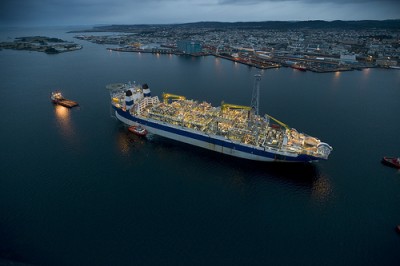Det Norske Oljeselskap announced on Monday it had bought out Marathon Oil Norway for NOK 12.6 billion (USD 2.1 billion). The acquisition extends industrialist Kjell Inge Røkke’s hold on the Norwegian continental shelf, while new figures show oil recovery out of the area is at 26-year low.

Røkke is the majority shareholder in both Det Norske and Aker ASA, and sits on the companies’ board of directors. Newspaper Dagens Næringsliv (DN) reported the buy-out of Marathon Oil was worth more than Det Norske’s own value, financed entirely through loans from banks BNP Paribas, DNB, Nordea and SEB. The payment was based on Marathon Oil Norway’s gross value of NOK 16.2 billion, adjusted for debt, net working capital and interest on the net purchase price. The “tax synergies” of the purchase meant Det Norske would be, in practice, debt free on an after-tax basis.
“The acquisition of Marathon Norway is a big step for Det norske as a company,” said Chief Executive Officer Karl Johnny Hersvik in a press release. “Marathon Norway is an excellent fit for Det norske, given the operational expertise, access to cash flow and the production profile it brings. The acquisition is important when it comes to meeting our funding requirements for (oil field developments) Ivar Aasen and Johan Sverdrup, and to reducing Det norske’s overall risk profile.”
The company announced a rights issue of USD 500 million to strengthen its equity base. Aker Capital AS committed to a 49.99 percent pro rata share, with the remainder underwritten by the bank consortium. The new equity issue meant Det Norske’s work program is secured until production begins on Johan Sverdrup, scheduled for Februrary 2015.
Continental shelf growth
“This puts the company in a position to play an even more important role in the development of the Norwegian continental shelf,” said Aker Chief Executive Øyvind Eriksen in a separate statment. “The financing needs for the company’s ongoing work program have been resolved, which creates visibility for Aker’s future capital needs. With the current transaction, we believe that significant value has been created for shareholders in both Det Norske and Aker.”
Det Norske went on in its release to say that Marathon’s operational expertise from its Alvheim field, cash flow and production profile meant the two companies’ skills were complementary. There would be no redundancies as a result of the acquisition, which would increase Det Norske’s workforce to more than 450 employees.
Subject to approval by the authorities, the agreement is expected to be completed during the fourth quarter of 2014. The merger gives Det Norske a total of 202 billion barrels of oil equivalent (boe) in proven and probable reserves, as well as contingent resources of 101 million boe excluding the Johan Sverdrup reserves. Another 80 million boe is estimated within Marathon’s portfolio.
“Combined 2013 production for the two companies amounted to approximately 84 thousand boe per day, making Det norske one of the largest listed independent exploration and production companies in Europe in terms of output,” read the statement.
Production halved
The announcement came after newspaper Aftenposten reported on Sunday that Norway’s oil recovery has more than halved, falling by 53 percent since its peak in 2000 according to Statistics Norway (Statistisk Sentralbyrå). Recovery is now the lowest it has been since 1988. “This is because the recovery from the large oilfields that were found in the 1980s are slowing,” said Eldbjørg Vaage Melberg from the Norwegian Petroleum Directorate (Oljedirektoratet). “No new large fields have been found to replace them.”
Oil prices meanwhile skyrocketed, shielding Norway’s coffers from the effects of reduced production. In 2000, Brent blend crude oil was worth USD 28.50 per barrel, more than double what it had been two years earlier. The price rose every year to almost USD 100 a barrel before a fall caused by the financial crisis. The price remained stable at an average of around USD 110 per barrel from 2011 to 2013.
“Two conditions in the past 10 years have helped to increase the oil price,” said oil analyst Torbjørn Kjus from DNB Markets. “The Chinese have expanded, they have become more prosperous and they have moved to the cities. This has increased demand for oil. At the same time countries outside the Organization of Petroleum Exporting Countries (OPEC) have not managed to increase their recovery before the past decade. In sum, this has given rise to increased oil prices.”
Meanwhile gas production has more than doubled since 2000, with Norway producing more gas than oil for the first time in 2010. This is because both oil and gas are found in most fields, but gas extraction has to wait until most of the oil is removed. “When the large fields are almost empty of oil, the companies switch to recovering the gas from these fields,” Melberg told Aftenposten.
One ton of oil equivalent in the form of gas is worth less than one ton of oil, however. “In recent years, the gas price has been about half of the oil price, calculated per unit of energy,” said Kjus. “Right now it’s even lower.”
All-time high investment
With oil companies including Marathon, Aker and Det Norske investing at an all time-high, the petroleum directorate predicted the decline in oil recovery is likely to turn around. NOK 207 billion was invested in production and pipelines last year, a figure Norges Bank predicted would remain steady until 2017.
“The oil price is high, and therefore the oil companies are spending steadily greater amounts on producing and searching for oil,” said Kjus. “But this can only continues as long as the oil prices rise. That is why the oil investments have stabilized in recent years.”
newsinenglish.no/Emily Woodgate

